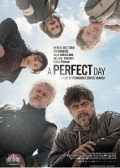
Directed by
Fernando Leon de Aranoa
106 minutes
Rated M
Reviewed by
Chris Thompson

Perfect Day, A
Synopsis: When their only length of rope breaks whilst trying to remove a dead body from a well in a small village somewhere in the former Yugslavia during the Balkans War, veteran aid workers Mambru (Benicio Del Toro) and B (Tim Robbins) along with first timer, Sophie (Melanie Thierry), and their Interpreter, Damir (Fedja Stukan), ave only hours to find a replacement rope before the corpse poisons the water supply. Their task is further complicated when they take on two passengers, local boy Nikola (Eldar Residovic) who wants to go home and get his soccer ball and Mambru’s former girlfriend. Katya (Olga Kurylenko), who’s been sent by head office to shut their mission down. Together, they must outwit pedantic UN bureaucrats, military factions, exploitative local criminals and a booby-trapped cow as they search the countryside for the elusive length of rope.There is a fine tradition of darkly funny anti-war films that hit a bit of a peak almost fifty years ago with Mike Nichols' Catch-22 (1970), Robert Altman’s M*A*S*H (1970) and, my favourite of the bunch, Sydney Pollack’s Castle Keep (1969). These were films that looked at the absurdity of war, it’s bizarre bureaucracies and its moral dilemmas through the eyes of the soldiers as they grappled with their humanity in the face of horrendous and largely inhumane events. It’s no mean feat to find humour in such awful circumstances. Each of these three classic films (all based on novels) did just that and now de Aranoa’s adaptation of Paula Farias’ 2015 novel "Dejarse Llover" can be added to the canon as one of the more absurd conceits for black anti-war humour – the hunt for a length of rope.
Here, though, the story is not told through the eyes of the soldiers but by those who work alongside (and are regularly frustrated by) the UN Peacekeepers. They are civilians in a war zone (although, strictly speaking, this story is set immediately after the Balkans war has ceased) and the composition of the team is a cleverly-balanced dynamic that adds to the tensions on the ground – Damir is a local and can’t be as objective as the others, Sophie is young, inexperienced and idealistic, Mambru and B are older, more cynical and pragmatic. It’s a good combination and del Toro and Robbins carry off the world-weariness of their characters with ease, even if they do so at the expense of the female characters who, despite one great scene where Sophie takes on the UN Commander, are assigned the task of carrying the more vulnerable, naive and emotional aspects of the film. This may well be an intentional reflection of gender roles in the 1990s but it jars nevertheless.
The weakest aspect of the film is the relationship between Mambru and Katya with whom he had an affair. Mambru’s current relationship is with a woman whom we only know through anecdotes and one side of a telephone conversation. It was her he cheated on with Katya and she not only knows about it, but she finds out that Katya is along for this ride. It’s an unnecessary distraction from the heart of the story and really only serves to lessen the authority of Katya by allowing Mambru and B to bemoan the trials that women put them through.
Putting these qualms aside, though, the other ‘passenger’ in the story, Nikola, has the opposite effect, by giving us both a human face and a tragic story to encapsulate the reasons why they would go to such efforts and risk their lives over the fate of one small well. When the film focuses on the main game we are treated to an array of situations where the politics of warfare (and one very mean looking dog) serve to frustrate their efforts: although they find several lengths of rope, they mostly prove to be unattainable. These moments, along with the recurring appearance of the old woman walking her cows home through the minefields, are what allows the film to tell its story on a very human scale. A Perfect Day is not a perfect film - for my money, a film like Danis Tanović’s No Man’s Land (2001) which covers very similar territory in a very similar setting, comes much closer to the mark – but it’s still a very enjoyable film that, despite its unevenness, has something worthwhile to say.

Want more about this film?


Want something different?




